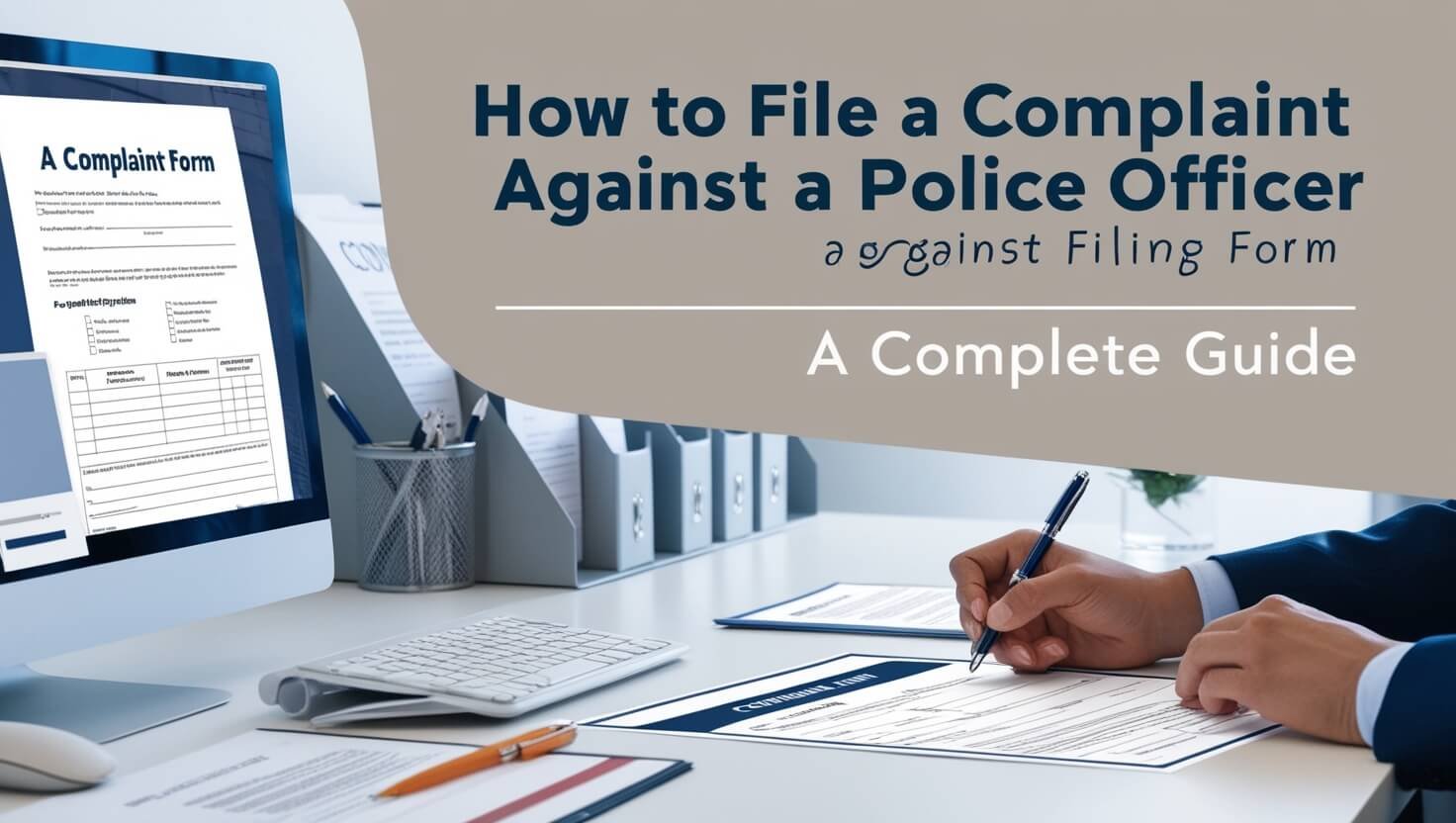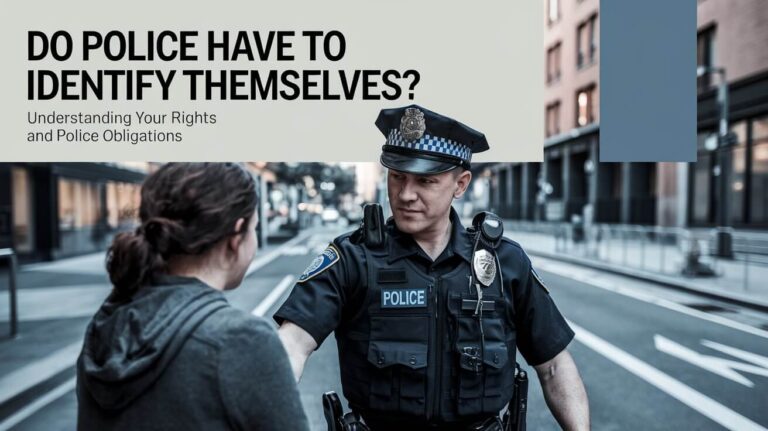How to File a Complaint Against a Police Officer: A Complete Guide

Police officers should protect citizens, but sometimes they don’t follow the rules. If a cop treats you badly, you can tell on them. This is called filing a complaint. You have the right to do this. We’ll explain how to file a complaint about a police officer who did something wrong. You’ll learn what your rights are and what steps to take next.
Understanding Your Rights When Filing a Police Complaint
Before diving into the complaint process, it’s important to know your rights. The U.S. Constitution protects citizens from unreasonable searches and seizures, excessive force, and discrimination by law enforcement.
Constitutional Protections for Citizens
The Fourth Amendment guards against unreasonable searches and seizures. This means police can’t search you or your property without probable cause or a warrant, except in specific circumstances.
The Fourteenth Amendment ensures equal protection under the law. It prohibits police from discriminating based on race, religion, gender, or other protected characteristics.
Legal Basis for Filing Complaints Against Law Enforcement
State and federal laws provide the framework for holding police accountable. These laws allow citizens to file complaints when they believe an officer has violated their rights or department policies.
Many police departments have internal affairs divisions dedicated to investigating officer misconduct. Additionally, some cities have independent oversight agencies to handle complaints against police.
Common Reasons for Filing a Complaint Against a Police Officer
People file complaints against police officers for various reasons. Understanding these common issues can help you determine if your experience warrants a formal complaint.
Excessive Force or Brutality
One of the most serious allegations is the use of excessive force. This occurs when an officer uses more force than necessary to control a situation. Examples include:
- Unnecessary physical violence
- Using weapons without justification
- Continuing to use force after a person is restrained
Unlawful Arrest or Detention
If you believe you were arrested or detained without probable cause, you may have grounds for a complaint. This could include:
- Being held without charges
- Arrest based on false information
- Detention beyond the legal time limit
Discrimination or Bias
Complaints of bias often involve officers treating individuals differently based on:
- Race or ethnicity
- Gender or sexual orientation
- Religion
- Age
- Disability
Misconduct or Unprofessional Behavior
This broad category covers various inappropriate actions, such as:
- Verbal abuse or offensive language
- Failure to identify oneself as an officer
- Neglect of duty
- Accepting bribes or engaging in corruption
Steps to File a Complaint Against a Police Officer
Filing a complaint requires careful preparation and following the correct procedures. Here’s a step-by-step guide to help you through the process.
Gathering Evidence and Documentation
Start by collecting all relevant information about the incident:
- Write down everything you remember as soon as possible
- Note the date, time, and location of the incident
- Get the officer’s name and badge number if possible
- Collect contact information for any witnesses
- Gather any photo or video evidence
- Keep copies of any related medical records or property damage reports
Identifying the Correct Agency to File Your Complaint
Determine which agency should receive your complaint:
- For local police, file with the city police department
- For sheriff’s deputies, contact the county sheriff’s office
- State police complaints go to the state law enforcement agency
- Federal officer complaints are handled by the specific federal agency
Some cities have independent review boards or civilian complaint offices. Check if your area has such an agency, as they may offer a more impartial process.
Writing an Effective Complaint Statement
Your complaint should be clear, concise, and factual. Include:
- Your personal information
- Details of the incident (who, what, when, where, why, how)
- Names and badge numbers of officers involved
- Witness information
- Description of any injuries or property damage
- What you believe the officer did wrong
Stick to the facts and avoid emotional language or speculation about the officer’s motives.
Submitting Your Complaint Through Proper Channels
Follow the agency’s official complaint procedure. This may involve:
- Filling out a specific complaint form
- Submitting your written statement
- Providing copies of evidence
- Signing the complaint under penalty of perjury
Keep copies of everything you submit and note the date and method of submission.
Different Methods for Filing a Police Complaint
Agencies often provide multiple ways to file a complaint. Choose the method that works best for you.
In-person Complaints at the Police Station
Visiting the police station to file a complaint allows you to:
- Speak directly with a supervisor
- Get immediate confirmation of your complaint
- Ask questions about the process
However, some people may feel uncomfortable going to the station, especially if their complaint involves that department.
Online Complaint Submission Process
Many departments now offer online complaint forms. This method:
- Is convenient and accessible 24/7
- Allows you to take your time filling out the form
- Provides a digital record of your submission
Make sure to print or save a copy of your submitted form.
Filing Through Independent Oversight Agencies
If available in your area, independent agencies can offer:
- A more neutral investigation process
- Specialized knowledge of police conduct standards
- Additional resources for complainants
Research to see if your city or state has such an agency.
Using Hotlines or Dedicated Complaint Numbers
Some departments have phone hotlines for complaints. These can be useful for:
- Quick reporting of incidents
- Getting immediate advice on the complaint process
- Accommodating those who prefer verbal communication
Always follow up a phone complaint with a written statement for official records.
What Happens After You File a Police Complaint?
Understanding the post-filing process can help set realistic expectations and prepare you for next steps.
Initial Review and Classification of Complaints
Once received, your complaint will typically:
- Be logged and assigned a case number
- Undergo initial review to determine its severity
- Get classified based on the type of allegation
- Be assigned to an investigator or unit
Investigation Process and Timelines
The investigation may involve:
- Interviewing you, the officer(s), and witnesses
- Reviewing evidence, including body camera footage if available
- Examining relevant policies and procedures
Timelines vary, but most agencies aim to complete investigations within 30-90 days.
Possible Outcomes and Disciplinary Actions
Complaints can result in various outcomes:
- Sustained: The allegation is supported by sufficient evidence
- Not sustained: There’s insufficient evidence to prove or disprove the allegation
- Unfounded: The allegation is false or not factual
- Exonerated: The incident occurred, but the officer acted properly
If sustained, disciplinary actions may range from verbal warnings to termination, depending on the severity of the misconduct.
Appeals Process for Unsatisfactory Resolutions
If you’re unhappy with the outcome, you may have the right to appeal. This often involves:
- Submitting a written appeal within a specific timeframe
- Providing reasons why you believe the decision was incorrect
- Possibly presenting your case to a review board
Check with the investigating agency for specific appeal procedures.
Tips for Effectively Filing a Complaint Against a Police Officer
To increase the chances of a fair resolution, keep these tips in mind throughout the process.
Staying Calm and Professional Throughout the Process
Maintain a respectful demeanor when:
- Interacting with department staff
- Providing statements or evidence
- Responding to questions or requests for information
Your professionalism can positively influence how your complaint is perceived and handled.
Keeping Detailed Records of All Interactions
Document every step of the complaint process:
- Save copies of all forms and correspondence
- Note dates and times of phone calls or meetings
- Keep a log of everyone you speak with about your complaint
This information can be crucial if you need to escalate your complaint or take legal action.
Knowing Your Rights During the Complaint Process
Familiarize yourself with your rights, including:
- The right to file a complaint without retaliation
- Access to interpreter services if needed
- The ability to have an advocate present during interviews
Don’t hesitate to assert these rights if necessary.
Seeking Support from Advocacy Groups or Legal Professionals
Consider reaching out to:
- Civil rights organizations for advice and support
- Legal aid societies for free or low-cost legal assistance
- Community advocacy groups familiar with local police issues
These resources can provide valuable guidance and representation throughout the process.
Overcoming Common Challenges When Filing Police Complaints
Filing a complaint against a police officer can be daunting. Awareness of potential obstacles can help you navigate the process more effectively.
Dealing with Intimidation or Retaliation
While retaliation is illegal, some complainants fear negative consequences. To protect yourself:
- Document any perceived intimidation attempts
- Report threats or harassment to the investigating agency
- Consider filing your complaint through an independent oversight body
Remember, you have the right to file a complaint without fear of reprisal.
Complex Bureaucratic Processes
The complaint system can be confusing. To stay on track:
- Ask for clear explanations of each step in the process
- Request written copies of policies and procedures
- Don’t hesitate to ask questions if something is unclear
Many agencies have victim advocates or ombudsmen who can guide you through the process.
Addressing Potential Conflicts of Interest in Investigations
Concerns about impartiality are common when police investigate their own. To mitigate this:
- Request an external investigation if you have concerns
- Ask about the investigator’s background and any potential conflicts
- Consider involving independent oversight agencies or civil rights groups
Transparency in the investigation process is crucial for maintaining public trust.
Alternative Dispute Resolution Options for Police Complaints
Sometimes, formal complaints aren’t the only way to address issues with law enforcement. Alternative methods can offer more flexible and collaborative solutions.
Mediation Programs for Citizen-Police Conflicts
Some departments offer mediation, which can:
- Provide a neutral setting to discuss the incident
- Allow both parties to express their perspectives
- Lead to mutual understanding and resolution
Mediation works best for minor misconduct or miscommunication issues.
Community Review Boards and Their Role
These civilian-led boards:
- Review complaint investigations
- Make recommendations for policy changes
- Increase transparency in the complaint process
Check if your community has such a board and how to engage with them.
Restorative Justice Approaches in Police-Community Relations
Restorative justice programs focus on:
- Repairing harm caused by misconduct
- Bringing together affected parties for dialogue
- Developing solutions that address community needs
These approaches can lead to meaningful changes in police practices and community relations.
Legal Options Beyond the Internal Complaint Process
When internal processes don’t yield satisfactory results, legal avenues may be necessary to seek justice.
When to Consider Civil Litigation Against Law Enforcement
Civil lawsuits may be appropriate in cases of:
- Serious civil rights violations
- Significant injuries or damages
- Systemic issues within a police department
Consult with a civil rights attorney to evaluate the strength of your case and potential outcomes.
Federal Civil Rights Complaints and Department of Justice Involvement
For severe or widespread abuses, you can file a complaint with:
- The U.S. Department of Justice Civil Rights Division
- Your local FBI office
These agencies can investigate patterns of misconduct and enforce federal civil rights laws.
State-Specific Legal Remedies for Police Misconduct
Each state has its own laws regarding police accountability. Look into:
- State civil rights commissions
- Attorney General’s office complaint procedures
- State-specific statutes on police misconduct
A local civil rights attorney can guide you through state-specific options.
The Importance of Police Accountability and Oversight
Filing complaints against police officers isn’t just about individual incidents. It’s a crucial part of maintaining a fair and effective law enforcement system.
How Citizen Complaints Contribute to Systemic Reforms
Complaints can lead to:
- Identification of problematic officers or practices
- Updates to training programs and policies
- Increased transparency in police operations
Your complaint could be the catalyst for important changes in your community.
The Role of Body Cameras and Other Technologies in Accountability
Modern technology plays a growing role in police oversight:
- Body cameras provide objective evidence of interactions
- Dashcams capture traffic stops and pursuits
- Smartphone videos from bystanders offer additional perspectives
These tools can support or refute complaint allegations, making investigations more thorough.
Balancing Public Safety and Officer Rights in Complaint Processes
Effective complaint systems must:
- Protect citizens from misconduct
- Ensure fair treatment of accused officers
- Maintain public confidence in law enforcement
Striking this balance is crucial for a just and effective police force.
Filing a complaint against a police officer is a serious matter that requires careful consideration and preparation. By understanding your rights, following proper procedures, and persisting through challenges, you can play a vital role in holding law enforcement accountable and improving police-community relations. Remember, every citizen has the right to fair and lawful treatment by police, and the complaint process is an important tool in upholding that right.






